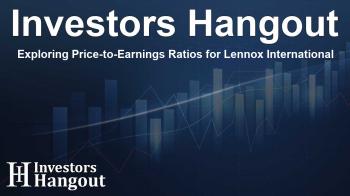Exploring Price-to-Earnings Ratios for Lennox International

Understanding Lennox International's Stock Performance
In the current market, Lennox International Inc. (LII) is trading at $571.18, experiencing a slight uptick of 0.65%. Over the last month, the stock has seen a modest increase of 1.86%, while over the past year, it has appreciated by 6.56%. This positive performance has left long-term shareholders feeling optimistic about the company's future, but it also invites scrutiny over its price-to-earnings (P/E) ratio to assess whether the stock is potentially overvalued.
Analyzing the P/E Ratio
The price-to-earnings ratio serves as a crucial measure for investors, comparing the current share price of a company against its earnings per share (EPS). Evaluating this metric allows long-term investors to put the company’s present performance in perspective with its historical earnings and industry norms. A rising P/E typically signals that investors have confidence in the company's forecasted performance, though it may also mean that the shares are overvalued at present.
How Lennox's P/E Compares
When scrutinizing Lennox International's P/E ratio of 25.29, it’s clear that it stands below the average P/E ratio for the Building Products industry, which is at 28.92. This disparity might suggest that shareholders believe the company will underperform relative to its competitors. However, it also opens the door to a possible undervaluation of the stock.
The Implications of a Low P/E Ratio
While a low P/E ratio can indicate undervaluation, it can also highlight potential concerns regarding the company’s growth prospects or financial health. Investors should exercise caution and avoid placing too much emphasis on this single metric. A thorough analysis should incorporate other financial ratios, market trends, and qualitative elements that can paint a more comprehensive picture of the company's financial stability.
Balancing Various Metrics
In summary, while the P/E ratio is an essential tool for assessing market performance, relying solely on it can present a skewed understanding of a company's true value. Investors should consider a variety of metrics and remain aware of broader industry trends. By taking a holistic approach to evaluating a company's finances, investors can make informed decisions that yield better investment outcomes.
Frequently Asked Questions
1. What is the significance of the P/E ratio?
The P/E ratio helps investors determine if a stock is overvalued or undervalued compared to its earnings.
2. How does Lennox International's P/E ratio compare to its industry?
Lennox's P/E ratio of 25.29 is lower than the Building Products industry's average of 28.92.
3. What does a high P/E ratio indicate?
A high P/E ratio typically suggests that investors expect strong future growth, which might also indicate overvaluation.
4. Should investors rely solely on P/E for investment decisions?
No, investors should consider other financial metrics and qualitative factors for a well-rounded analysis.
5. What are key considerations alongside the P/E ratio?
Factors such as market trends, other financial ratios, and qualitative assessments of business health are essential.
About The Author
Contact Evelyn Baker privately here. Or send an email with ATTN: Evelyn Baker as the subject to contact@investorshangout.com.
About Investors Hangout
Investors Hangout is a leading online stock forum for financial discussion and learning, offering a wide range of free tools and resources. It draws in traders of all levels, who exchange market knowledge, investigate trading tactics, and keep an eye on industry developments in real time. Featuring financial articles, stock message boards, quotes, charts, company profiles, and live news updates. Through cooperative learning and a wealth of informational resources, it helps users from novices creating their first portfolios to experts honing their techniques. Join Investors Hangout today: https://investorshangout.com/
The content of this article is based on factual, publicly available information and does not represent legal, financial, or investment advice. Investors Hangout does not offer financial advice, and the author is not a licensed financial advisor. Consult a qualified advisor before making any financial or investment decisions based on this article. This article should not be considered advice to purchase, sell, or hold any securities or other investments. If any of the material provided here is inaccurate, please contact us for corrections.

